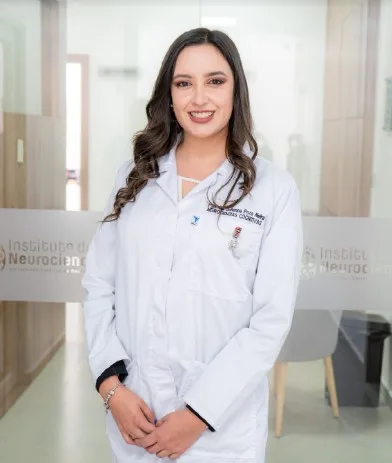Johanna Pozo, the first Ecuadorian member of the Society for Neuroscience, directs a groundbreaking treatment program in Cuenca
Universidad Católica de Cuenca is one of the few Universities that is rooting for academic excellence while providing services directed towards the Cuenca community.

Johanna Pozo is the director of the Institute of Neuroscience.
Two years ago, it opened the first Institute of Neuroscience in the city, providing mental health services with accessible prices for the general public. It is the first facility in the entire central-southern Ecuadorian region to present with state-of-the-art technology and provide non-invasive brain stimulation services at low cost.
The Institute of Neuroscience is currently run by Johanna Pozo. Johanna is a clinical psychologist, and studied her master’s degree in Cognitive Neuroscience at University College London (UCL), in the United Kingdom. UCL is currently among the top 10 Universities in the world. While studying in the program, Johanna was awarded the first prize for the Brain Awareness Video Contest, a science communications challenge run by the Society for Neuroscience (SfN). This is a global contest that aims to spread knowledge about the brain through simple, science-based videos. Johanna also received the People’s Choice Award for hew submission, which explain spatial navigation.
As this was the first worldwide recognition Ecuador has ever received in the Neuroscience field, Johanna was awarded the National Medal for Scientific Research, “Pedro Vicente Maldonado”, by the Ecuadorian National Assembly, in November 2020.
Johanna returned to Ecuador and became a Lecturer for the Neuropsychology department at Universidad Católica de Cuenca, and a therapist and researcher at their newly born Institute of Neuroscience. Johanna has also collaborated with other Universities in Ecuador, such as Universidad Casa Grande in Guayaquil, Universidad del Azuay and Universidad de Cuenca, in Cuenca, where she has been a lecturer for neurodevelopmental courses, and a dissertation mentor for their Master’s degrees. Johanna has also trained in Perinatal Mental Health at the University of Coimbra, in Portugal, one of the oldest universities in the world. Along with those qualifications, she is also a certified equine therapist which is a horse-assisted therapy.
In 2022, Johanna became the first Ecuadorian member of the Society for Neuroscience, with the support of two of her mentors from UCL. This is a great opportunity not only for her, but for all researchers in Ecuador willing to work in the Neuroscience field.
In April 2023, she became the manager of the Institute of Neuroscience. She explains that the treatment opportunities brought by the Institute are vast: non-invasive brain stimulation (NIBS) is one of the few techniques that provide quick results with very few (if any) side effects, and it can be used for different conditions, including treatment-resistant depression, obsessive-compulsive disorder, anxiety, chronic pain, fibromyalgia, motor conditions as sequalae of stroke, migraines, and more. The Institute has also helped autistic children deal with the anxiety of overstimulation, all while respecting neurodiversity and the individual characteristics of each patient.
The two NIBS technique applied at the Institute are “transcranial magnetic stimulation (TMS)” and “transcranial direct current stimulation (tDCS)”, both of which use electromagnetic principles to regulate neural activity due to the brain’s neuroplasticity properties. These treatments are ideal especially for those who have dealt with long-term conditions that have not responded to medication. All these treatments are FDA approved, and while regular costs for neuromodulation treatments can reach prices between $4,000 to $6,000, Universidad Católica de Cuenca covers up to 90% of the regular prices to promote accessibility, as social work is one of its core values. They also provide free workshops or talks for any entity that requires them, as their mission is to advocate for mental health. The Institute also works to develop research and public policies to aid mental health and its impact on the community.
Patients often notice the first symptoms of relief as early as after the first week of treatment, and its only side effects include a mild headache or mild discomfort while doing the procedure. It is important to say that these treatments do not include any type of sedatives, surgery, or medication, so patients can continue with their daily lives after the sessions without any difficulties.
The Institute of Neuroscience of Univesidad Catolica de Cuenca is located at the University Research Campus, in Ricaurte. To contact them, you can reach via Whatsapp or call 098 768 6206, email to inne@ucacue.edu.ec , or find them in social media as Instituto de Neurociencias Universidad Catolica de Cuenca for Facebook, and @neurocato for Instagram.
For more information, click here.
_________________
Graphic formatting assistance by Fred Deutsch
Credit: Neurosciences Institute





















